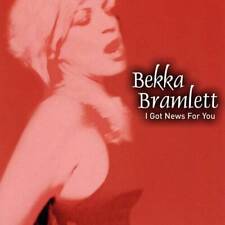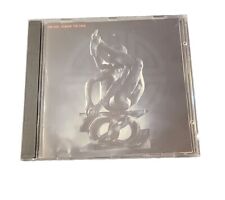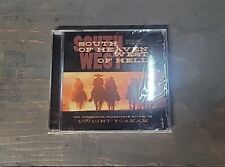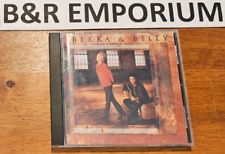|
Los Angeles Times, Whale-Balanced Career Los Angeles Times, March 2, 1995 Whale-Balanced Career; Though Mick Fleetwood Still Enjoys the Mac, His Blues Band Gives Him Some Freedom by Buddy Seigal, Special to the Times Marital discord and divorce. Substance abuse problems and mental illness. Religious sects and hedonistic excess. Fleetwood Mac has been known throughout its 27-year run as much for its "Geraldo"-fodder history and ever-changing personnel as it has for being among the most popular, top-grossing groups in rock. So it must come as something of a relief for drummer and founding member Mick Fleetwood when he steps away from the international spotlight to play with Mick Fleetwood's Blue Whale, a relatively low-profile blues band. Heating up nightclubs rather than arenas, Blue Whale--which performs Friday night at the Coach House--gives Fleetwood the chance to flash his considerable talents as a drummer, unrestricted by charted arrangements or commercial expectations. No one in Blue Whale is married to another band member; no one is chewing his mouth up with cocaine jitters, no one takes the stage in a quasi-religious white robe. Fleetwood spoke enthusiastically about the blues group in a recent phone interview from a Los Angeles studio, where yet another version of Fleetwood Mac is working on a new album. Blue Whale is fronted by singer and multi-instrumentalist Ron Thompson, a no-nonsense bluesman who has backed such legends as John Lee Hooker, Big Mama Thornton and Jimmy Reed as well as touring and recording with his own group, the Resistors. Thompson, a Bay Area fixture who recently relocated to Los Angeles, had jammed on and off with Fleetwood for over a decade, and they formed Blue Whale as a part-time touring group four years ago. "I'm a very big fan of Ron's, and we've become very close friends over the years," said Fleetwood, 52. "It's sort of an unlikely marriage. I think he was shocked at first by this strange Englishman he didn't quite understand. He was at least aware of (original FM guitarist) Peter Green's work from the old days of the Mac, so it helped lessen this bizarre connection. He's very down to earth, and he's come up the hard way. He knows his stuff. He comes from this genre of music. He's not a lightweight, and that's what really struck up this relationship--the realness of what Ron gets into." * Rounded out by keyboardist Deacon Jones, bassist Bill Campbell and percussionist Oliver Brown, Blue Whale performs a mix of blues covers and originals patterned after the rockin' sounds of performers such as Howlin' Wolf and Elmore James. Fleetwood professes to take the group quite seriously and hopes to release a Blue Whale album later this year on his own label, Fleetwood Records, just getting off the ground back home in England. "This certainly isn't a lark," he said. "There's a lot of passion and a lot of love in playing with Ron. There's maybe 20% more of an opportunity to let it rip than you have in the Mac, because you're not playing such strict arrangements. There's more freedom." Fleetwood has been a big blues fan from his maiden days with Fleetwood Mac, whose original lineup is most fondly remembered by blues aficionados for the work of original guitarists Jeremy Spencer and Green. (Green wrote the hits "Black Magic Woman" and "Oh Well.") But by 1971, both guitarists had left the group. Green renounced his Jewish upbringing and became involved in a hippie-fied brand of Christianity. He became disenchanted with being a "rock star" and quit the group in the midst of a European tour in 1970. Some years later, he was briefly committed to a mental hospital after attacking an accountant who attempted to deliver a Fleetwood Mac royalty check. "Peter basically ceased to see the light with Fleetwood Mac and had aspirations of playing for nothing in strange places--none of which really happened," remembered Fleetwood. "He made several interesting albums after he left, then basically took a left turn in terms of his psyche. . . . He pulled out of the mainstream and chose to stay at home. He doesn't play much anymore, which is certainly a shame, because he's my mentor, and he's the reason that Fleetwood Mac became what we became. "We owe Peter a lot, and that's never been spoken about enough . . . he's a heavyweight--the B.B. Kings and Eric Claptons and so forth all recognize Peter as being a major, major talent. I speak with him occasionally, and he's usually fairly communicative, although sometimes he can be a bit distant. He's on medication, but it's not like he's departed from the world. It's a drag for me. It's a shame this man is not active. He had so much passion, and his attitude . . . I'll always set my guidelines by Peter Green." Fleetwood has also maintained communication with Spencer, who quit the group less than a year after Green to become involved with a religious sect called the Children of God, an affiliation he retains. "Jeremy's alive and well, he has nine children, and he lives in Rio de Janeiro," Fleetwood said. "He's been all over the world with the Children of God. I'll certainly go on the record as saying that in my mind--and I'm being polite--they've always been something less than perfect in terms of the way things are run. But the man's happy; he's doing what he wants to do, and so be it." Following the group's initial incarnation as a blues band, Fleetwood Mac--with the addition in 1974 of Stevie Nicks on vocals--went on to become one of the top groups of the '70s and '80s, racking up such hits as "Rhiannon (Will You Ever Win)," "Go Your Own Way," "Dreams" and "Don't Stop." Through numerous personnel changes, the group remained consistently popular up to its last album, 1990's "Behind the Mask." Fleetwood Mac's latest lineup features Billy Burnette and original Traffic member Dave Mason on guitars, Becca Bramlett on vocals and Steve Toma on keyboards, along with Fleetwood and bassist John McVie, the only members who have remained with the group since the beginning. Always a band known to put many hours (not to mention dollars) into its albums, the refurbished Mac will release its next album--nearly two years in the making--later this year. Why the laborious recording schedule? "Well, if we were talking about the old days, I could tell you all kinds of weird, exotic stories, but no more," Fleetwood said with a chuckle. "We're just working. We're very picky with song selection. The Mac seemingly make an album once every five years, so it's an important move. We take a lot of care." Another new aspect of Fleetwood Mac is the prospect of Fleetwood's first sober tour with the group. "Basically, I played drunk for 25 years," he said. "When I first played sober (with Bramlett's band), I wondered if I was playing in enough of an uninhibited way, but that no longer exists. It took a little while to get used to, but now it doesn't even occur to me. I get nervous in the same way I always do, but then you just get on the stage and off you go. I'm loving it." Gone this time will be the voices of Nicks and Christine McVie (McVie is contributing to the album but will not tour), who sang most of Fleetwood Mac's biggest hits. But Fleetwood remains confident about the group's sound and commercial potential. He's particularly pleased with the addition of Mason. "It's probably a lot more meat and potatoes than we've had in a while, and Dave . . . well, Dave is Dave," he said. "I've known him for a real long time, and he's worked out real well. He's a survivor--much like this band is. God knows I understand the meaning of that word. I've had my shares of ups and downs and come through it all with a grin on my face." Thanks to Les for posting this to the Ledge and to Anusha for formatting and sending it to us.
|









